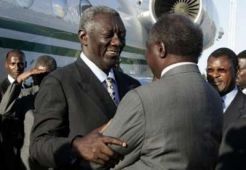More violence in Kenya as African Union prepares for talks
January 9, 2008 (NAIROBI) — Kenya suffered fresh violence overnight as the African Union prepared for talks on Wednesday to end post-election turmoil that has killed 500.
 After a lull in clashes that erupted following President Mwai Kibaki’s disputed re-election at Dec. 27 polls, Kibaki named 17 ministers on Tuesday — prompting further protests.
After a lull in clashes that erupted following President Mwai Kibaki’s disputed re-election at Dec. 27 polls, Kibaki named 17 ministers on Tuesday — prompting further protests.
Witnesses said one man was shot dead in Kisumu, a western stronghold of opposition leader Raila Odinga, where hundreds of rioters built burning barricades and stoned cars.
Slum residents in Nairobi said opposition supporters also took to the streets, some of them brandishing machetes.
“They are going wild. They are very angry about the new cabinet,” Onyango Apudo, a boxer who lives in the capital’s sprawling Mathare shanty-town, told Reuters.
Locals in Kibera, another Nairobi slum that is one of Africa’s biggest, said Odinga supporters were also demonstrating there, and that vehicles heading for the area were turning back.
Nearly 500 people have died in the violence and tribal clashes since an election that the opposition says was rigged and foreign monitors said fell short of democratic standards.
Odinga’s Orange Democratic Movement (ODM) on Tuesday rejected an offer of bilateral talks from Kibaki, saying they would be a “sideshow” if not chaired by international mediators.
Hours later, Kibaki unveiled a cabinet that the opposition saw as an attempt to cement his victory and reduce the scope for a national unity government, which he also offered earlier.
The ODM said Kibaki’s move was illegal and made a mockery of his agreement to enter serious talks mediated by AU chairman and Ghanaian President John Kufuor, who arrived for crisis meetings with both sides.
INTERNATIONAL PRESSURE
Kibaki did not invite Kufuor to the bilateral talks, and Kenyan government officials said the AU leader would only stay in Nairobi for little more than 24 hours.
Washington pressed Kenya’s opposition and government to hold talks as its top diplomat for Africa, Jendayi Frazer, extended a visit to help reconcile the two.
“It is of primary importance that they open up those channels of communication,” a State Department spokesman said.
Stoking anger among ODM supporters, Kibaki retained several figures in his new cabinet who are loathed by the opposition, including former hardline Internal Security Minister John Michuki, who moved to the roads ministry.
Kibaki said his partial cabinet would ensure the government was able to run the country as required by the constitution.
“When my government is fully constituted as a result of dialogue, it will be broad-based and represent the will of the people of Kenya,” he said in a statement late on Tuesday.
Much of Kenya’s post-election turmoil has pitted ethnic Luo supporters of Odinga against Kikuyu members of Kibaki’s tribe and the security forces.
But Kibaki’s naming of Kalonzo Musyoka, from the Kamba ethnic group, as vice-president triggered attacks on Kambas, who some ODM supporters accused of selling out the opposition.
“The Luos are now targeting Kambas, saying they should go and join the Kikuyus,” one Kibera resident told Reuters.
Musyoka, a former foreign minister, came a distant third in the presidential election, behind Kibaki and Odinga.
Despite huge international pressure, especially from Western powers, the two front-runners have still not met face-to-face since trouble started when Kibaki was sworn in on Dec. 30.
Odinga says Kibaki must step down and agree to a new election. Kibaki is reluctant to accept international mediation and his officials say the crisis is an internal matter.
On Tuesday, Finance Minister Amos Kimunya — who was reappointed to the same job — told Reuters the turmoil could cost east Africa’s biggest economy around $1 billion.
The International Monetary Fund’s Africa director, Abdoulaye Bio-Tchane, said supplies of commodities, including petroleum, had been disrupted to and from neighbouring Uganda, Tanzania, Rwanda and Sudan, which all rely on Kenya’s port of Mombasa.
He said the overall impact had been limited, but if the crisis persisted, “the consequences could be much more severe”.
Britain and the United States have pressed Kibaki and Odinga to negotiate a solution to one of the worst crises since Kenya’s independence from Britain in 1963.
(Reuters)
